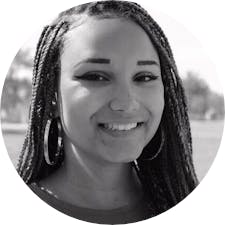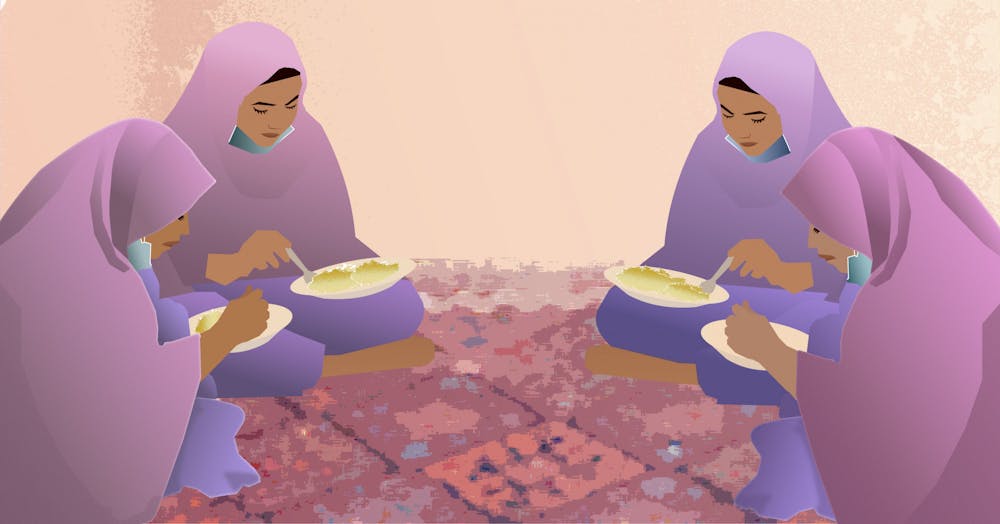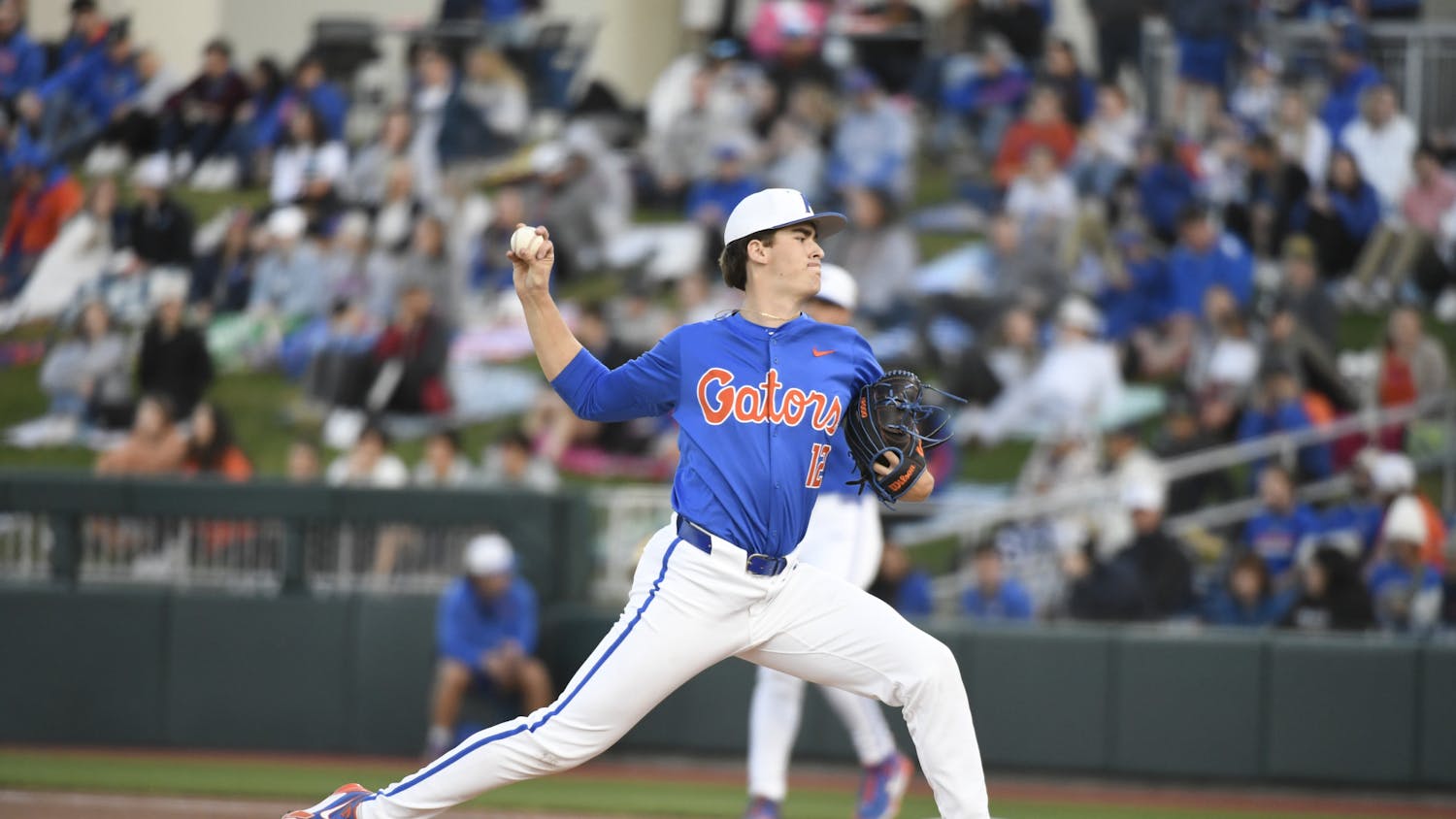Nusrat Yeasmin follows prayer rules and touches her forehead, nose, palms, knees and toes for the third time onto a crimson carpet embellished with beige arabesque patterns. In another room downstairs, her husband and son do the same after breaking their 14-hour fast.
When her son, Ahmad, was about two months old, the COVID-19 pandemic spiraled the world into chaos, restricting Yeasmin and her family to celebrate the Islamic holy month at home. Now, the 1-year-old boy is observing Ramadan with fellow Muslims in the community for the first time.
“We could not come to mosque, and we know that this is Allah’s house,” she said. “When we cannot come here, we are mentally broke[n].”
After eating a meal before dawn, the family refrains from food and drink until sunset, when they gather with other Muslims at The Islamic Center of Gainesville for iftar, a meal to break the fast. They pray maghrib at sunset, and some gather about an hour and a half later for taraweeh, a nighttime prayer specifically for Ramadan.
Yeasmin’s family is among the 1.6 million people who observe Ramadan, the ninth month of the Muslim year.
Islam follows the lunar cycle, so the month of Ramadan changes each year. This year, it started on April 13 and ended on May 12. Eid Al-Fitr, a celebration of the end of Ramadan known as the “Festival of Breaking the Fast” fell on May 13. On Eid Al-Fitr, the Islamic community gathers to feast, pray and give each other gifts.
When city mosques like the Hoda Center closed at the pandemic’s start, plans for Eid were uncertain for weeks. A year later, the center is excited to attempt a return to normalcy.
The communal prayers first-year UF medical student Yusuf Mehkri led on Eid had to be in person. Last year, the community prayed at home and the celebration, along with events worldwide, was canceled for their safety.
But this year, the center rented out the Legacy Park Recreation Complex in the city of Alachua that could fit up to a few thousand socially distanced people before 9 a.m. on May 13. Breakfast was pre-packaged to ensure safety.
Used to leading daily prayers on Zoom, Mehkri, 22, felt a huge relief praying in-person.
“You never thought that one day would be your last day in months and months that you’d ever be able to step inside the place that you call your spiritual home,” he said.
Every day during Ramadan, Mehkri arrived at the Hoda Center 30 to 45 minutes before the 9:45 p.m. taraweeh prayer to set up the speaker system outside and a Zoom for those who joined at home.
Most of the people he knows in the Islamic community are vaccinated, Mehkri said, and there are strict guidelines inside the mosque, which was open during Ramadan. He enforces no physical contact and those praying must wear masks and adhere to limited capacity and spacing requirements.
His fellow Muslims couldn’t stand side-by-side or shake hands, an act the Prophet Muhammad performed. He said this, along with the phrase “Assalamu alaikum,” meaning “peace be upon you,” are part of Islam’s essential greeting.
Mehkri glanced at his friend who stood across the room in the mosque. He remembered when his friend forgot about the no-contact rules and tried to shake his hand. Swiftly, Mehkri placed his own hand on his chest as his friend realized his mistake. Often, people choose to fist bump instead.
“It’s not the same, but we’re definitely grateful,” he said.
Normally, when everyone stands shoulder-to-shoulder in the mosque, the room fits about 200 people. Now it only fits about 50 people who stand on yellow stickers six feet apart in all directions. At least 50 more people, usually physicians who may be exposed to COVID-19, pray outside. If it rains, Mehkri and others set up tents.
“The community gets together; it’s jam-packed,” he said about Ramadan pre-COVID-19. “You’re standing on top of someone, it’s a lot of people that are here eating together — it’s awesome. But obviously you can’t do that [anymore].”
Slowly the center is increasing capacity as more people get vaccinated, and it might reduce gaps to three feet.
Many Muslism students like Mehkri, haven’t gone back home since the pandemic started. Now vaccinated, he plans to return home to New Jersey sometime this summer.
“When you’re fasting all day, you wanna be around your family,” he said.
Omolola Suleiman feels the same. When she thinks of Ramadan, the smell of her mother’s signature Nigerian jollof rice and occasional pizza come to mind.
During last year’s Ramadan and Eid Al-Fitr celebrations, the pandemic forced the 20-year-old UF biology second year student to return home to Pembroke Pines, Florida. Her family and their home-cooked meals comforted her.
But this year, Suleiman feels isolated.
She stayed in Gainesville to study for finals, sometimes until 3 a.m., and then awakened by 5 a.m. for suhoor, the brief mealtime allowed before fasting. Occasionally, she slept in and woke up later to realize she missed breakfast.
Instead of her mother greeting her with fresh oatmeal at dawn, she scrambled to find yogurt or ramen — anything before time ran out at about 6 a.m. By the end of the month, she had to finish her meal by 5:30 a.m. as sunrise started earlier each day.
Without a car, the Hoda Center is a long way to travel at night and so she couldn’t attend the communal prayers with friends. Without her family and her community alongside her, she felt lonely Ramadan rushed by too quickly.
“I feel like I just started [fasting] yesterday,” she said.
Her summer classes began on May 10, a few days before Eid, so her parents are planning to make it up to her with an honorary celebration in July — if she can take the time off to visit.
Muslims like Sulieman had worries about the vaccine and how its side effects might interfere with fasting and wellbeing during Ramadan. Dashing to a vaccination appointment at UF, Sulieman was nervous she may need to break her fast if potential side effects progress past body aches.
“If they’re like really bad to where I need medication, I would break it,” she said ahead of the holiday. “If it’s like body aches I think I can withstand it.”
However, getting vaccinated doesn’t count as breaking the fast, according to Islamic experts, as taking other medications like Advil or drinking water would. Instead, Muslims are encouraged to make a vaccine appointment for their health and safety.
But if someone is feeling sick following a vaccine dosage, they would not have to fast, Mehkri said. Illness falls under the exclusions to fasting. Other exceptions include traveling, pregnancy and menstruation. But even though suffering while fasting is not allowed in Islam, many who feel slightly sick may choose to continue fasting. That’s because they are required to make up the days later and also miss out on “spiritual rewards” which are multiplied during Ramadan.
“You’re already kind of in that zone; you’re very spiritually connected,” Mehkri said. “Fasting or doing any good deed during this time is rewarded more than any other time of the year.”
Like last year, the Hoda Center did not host iftar meals, which signals the end of the day’s fast. Instead, the center continued to offer free meal pickup and delivery to students and city residents who needed meals and resources.
Families in the community volunteered to make home-cooked meals for those in need during Ramadan. Mehkri believes about 30 students signed up last year and delivered meals to other car-less students or those who need a meal in the Gainesville community. As someone who received a meal each day of Ramadan at his doorstep, Mehkri enjoyed the opportunity to eat food from other countries.
Cultural ties and upbringing can determine what specific foods people associate with Ramadan, he said. Home-cooked Turkish food may arrive one night, followed by Irani, Indian, Egyptian or North African dishes.
“Those [home-cooked] foods are cooked every night or very often during Ramadan and you can’t just go out and buy those from the restaurant,” he said. “It’s random, you have no idea what you’re gonna get the next day.”
The center also asked for $7 donations from the community to sponsor a meal per night so students and those in need can go to Falafel King to get a free meal like a gyro, falafel or chicken dish and pita bread, rice hummus and salad, instead of heading to the center. Other restaurants in town like Kabab House and Catering by Ghazala and Fazal from Kebob Cafe also took donations to sponsor iftar meals.
At the Islamic Center of Gainesville, where Nusrat Yeasmin and her family worship, Muslims break their fast with dates and water before participating in the maghrib call to prayer and finishing with a larger meal.
With a bite of rice, chicken and salad, the Yeasmin drank a sip of water and smiled as she said evening prayers were still restricted by the pandemic. But she’s thrilled to at least see some people in person.
In the center’s mosque with nine other women in long dresses, hijabs and masks, the 32-year-old mother recalled when the room could hold 40 to 50 people.
“We’re kind of limited in our activities, but at least we are relieved that we can come and pray and have iftar together,” she said.
For the first time, her son can flock around the center chasing a few other wide-eyed youngsters as they giggle and scream “mine” in bright pink hijabs and decorated purple dresses. No longer isolated, Yeasmin can watch her son trott up the stairs of the center celebrating a Ramadan she’s more familiar with.
Contact Asta Hemenway at ahemenway@alligator.org. Follow her on Twitter @AstaHemenway.

Asta Hemenway is a third-year senior majoring in Journalism. Born in Tallahassee, she grew up Senegalese American. When she’s not writing or doing school, she loves watching Netflix and Tiktok in her spare time.






